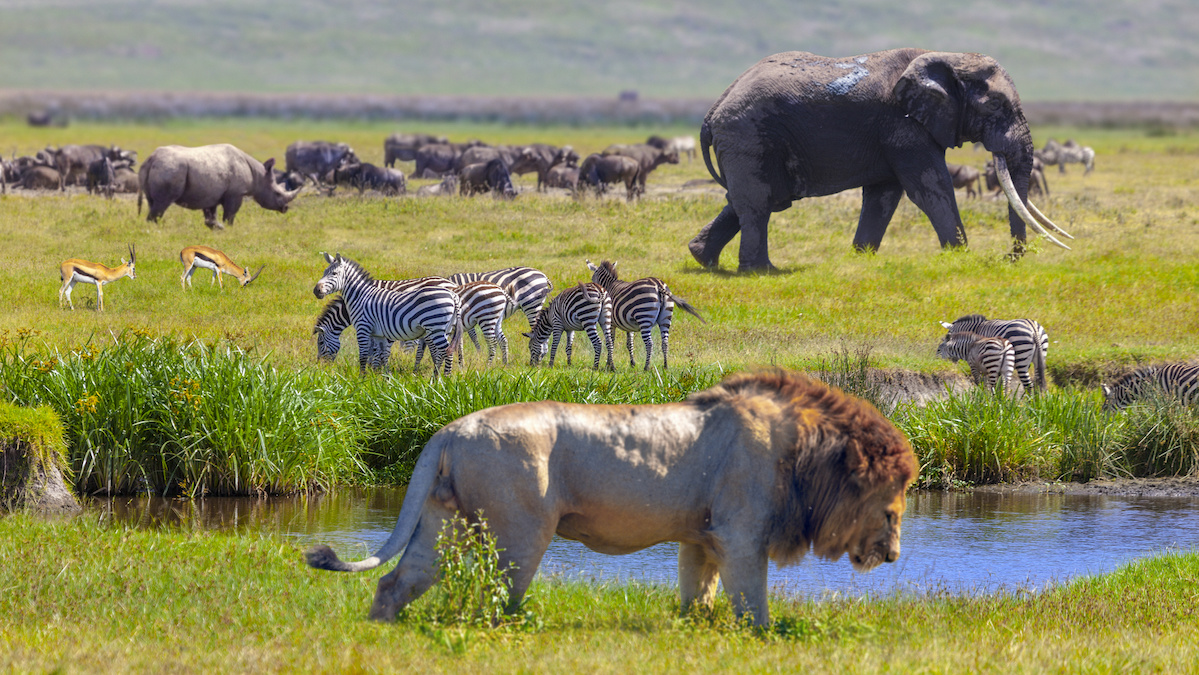

Rhino, springboks, zebra, elephant and lion in Serengeti National Park, Tanzania. ugurhan / E+ / Getty Images
The Department of the Interior (DOI) has disbanded a controversial council that promoted big game hunting after a judge ruled that environmental groups could challenge the legitimacy of the council in court, as The Associated Press reported.
The DOI told a federal judge on Friday that the International Wildlife Conservation Council (IWCC) had ended its charter in October and would not be renewed. The IWCC was created to boost trophy hunting and to relax federal regulations around importing heads and hides of exotic animals like African elephants, rhinos, lions, and other threatened wildlife, according to The Associated Press.
“The Council will not meet or conduct any business again, it can no longer be renewed, and there [is] no plan to establish another committee with a similar mission or scope in the future,” the DOI explained in a court filing Friday, according to NPR.
The lawyers for the DOI argued that since the council had been disbanded, the judge should dismiss a lawsuit from environmental groups looking into the “formation, composition, ethics provision, or meetings” by the IWCC, as NPR reported.
“The IWCC’s disbandment is a huge victory in the fight against the Trump administration‘s illegal advisory bodies,” said Democracy Forward senior counsel Travis Annatoyn, in a statement. “But the fight isn’t over.”
Democracy Forward is representing the Natural Resources Defense Council, the Center for Biological Diversity, the Humane Society of the United States and Humane Society International in a lawsuit challenging the legality of the IWCC under the Federal Advisory Committee Act (FACA). The disbandment announcement came on the heels of a slew of FACA lawsuits against the administration.
Former Secretary of the Interior Ryan Zinke, who had to resign under a corruption scandal, put the 16-member advisory board together. It was formed as a response to an Obama-era ban on elephant and lion trophy imports from Africa. In 2018, The Associated Press revealed that the board members were big-game hunters, many with direct ties to President Trump and his family, according to The Associated Press.
Animal rights groups and environmental activists cheered that the committee would not continue its work.
“I have little doubt our litigation spurred the administration’s decision to abandon the IWCC and walk away from its biased and un-transparent practices,” said Zak Smith, international wildlife conservation director for the Natural Resources Defense Council in a statement. “We’re glad the Trump administration is closing shop on this ridiculously misguided council and we await a full accounting of its tainted work product.”
The taxpayer-funded committee met five times over its two-year span and formed four sub-committees. The government said, “Ultimately, the IWCC did not vote on or make any recommendations or otherwise provide any advice or work product,” NPR reported.
“The end of Trump’s thrill-kill council is a huge victory for elephants, lions and other imperiled animals targeted by trophy hunters,” said Tanya Sanerib, international legal director at the Center for Biological Diversity, in a statement. “It’s still critical to address this biased committee’s past legal violations and prevent self-serving advice from trophy hunters from poisoning federal wildlife policies.”
IWCC members claimed that recreational hunting is necessary because fees paid by big-game hunters help fund conservation programs. They also argued that it boosts local economies and creates hundreds of jobs.
An Interior spokesperson told The Hill in a statement that the department “takes illegal wildlife trafficking seriously and will continue working to grow our partnerships, while continuing to move toward shared conservation stewardship.”
- Trophy 'Dream Hunt' With Donald Trump Jr. Starts Bidding at $10000
- Trump Admin Grants First Lion Trophy Import Permit Since Listed as ...
- Donald Trump Jr. Killed an Endangered Mongolian Sheep - EcoWatch
- Taxpayers Paid Over $75K So Trump Jr. Could Kill a Rare Sheep - EcoWatch

 233k
233k  41k
41k  Subscribe
Subscribe 